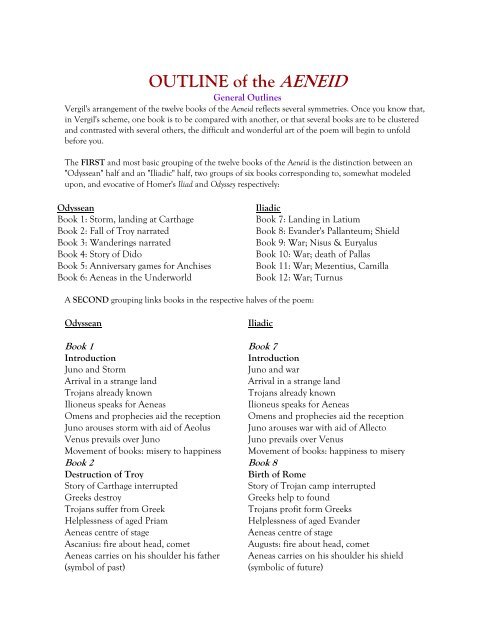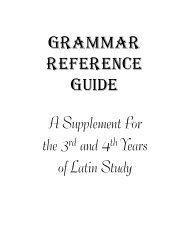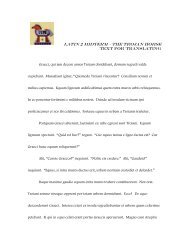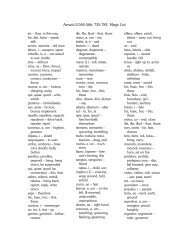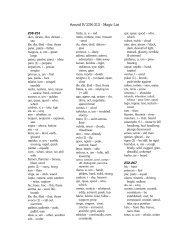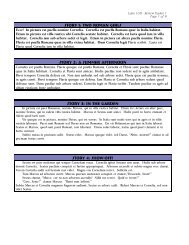You also want an ePaper? Increase the reach of your titles
YUMPU automatically turns print PDFs into web optimized ePapers that Google loves.
Book 3Interlude (<strong>of</strong> wandering)Aeneas has a minor roleAnchises importantHelenus and Adromache (joyful episode)Escape from danger: Cyclops, Scylla, CharbydisBook 4Tragedy <strong>of</strong> LoveVenus and Juno (agreement)Inner conflict <strong>of</strong> AeneasAffection yields to dutyGuilt <strong>of</strong> Dido: results in deathTurning point: Aeneas to depart; effect onDidoSuicide <strong>of</strong> Dido, who cannot live withoutAeneasBook 5Lessening <strong>of</strong> tension: gamesFuneral gamesAeneas quiets disputesIncrease <strong>of</strong> tension: burning <strong>of</strong> <strong>the</strong> shipsDeath <strong>of</strong> ParlinurusBook 6The Future RevealedAeneas receives his commissionDramatic progression: delays and suspense,climaxed by revelation <strong>of</strong> Rome's destinyAnchises reveals later Roman historyDeath <strong>of</strong> Marcellus consecrates <strong>the</strong> New OrderBook 9Interlude (at Trojan camp)Aeneas absentAscanius importantNisus and Euryalus (tragic episode)Escape from danger: Turnus in <strong>the</strong> TrojancampBook 10Tragedy <strong>of</strong> War: Pallas; Lausus & MezentiusVenus and Juno (conflict)Outer conflict <strong>of</strong> AeneasPity yields to justiceGuilt <strong>of</strong> Turnus: leads to death in Book XIITurning point: death <strong>of</strong> Pallas; effect onAeneasDeath Mezentius, who cannot live withoutLaususBook 11Lessening <strong>of</strong> tension: truceBurial <strong>of</strong> deadLatinus unable to avert dissensionIncrease <strong>of</strong> tension: renewal <strong>of</strong> fightingDeath <strong>of</strong> CamillaBook 12The Future AssuredAeneas fulfills his commissionDramatic treatment <strong>of</strong> combat: delays andsuspense, climaxed by victory <strong>of</strong> AeneasReconciliation <strong>of</strong> Jupiter and Juno creates laterRomansDeath <strong>of</strong> Turnus seals <strong>the</strong> doom <strong>of</strong> <strong>the</strong> OldOrderA THIRD grouping finds a series <strong>of</strong> book-pairs (W.S. Anderson,The Art <strong>of</strong> <strong>the</strong> <strong>Aeneid</strong>):Books 1 & 2: Carthage and TroyBooks 3 & 4: The Search for HomeBooks 5 & 6: Sicily and ItalyBooks 7 & 8: "War, a monster <strong>of</strong> two faces"Books 9 & 10: In defeat and victoryBooks 11 & 12: Turnus or Aeneas?
A FOURTH grouping notes three sections <strong>of</strong> <strong>the</strong> poem: opening, middle, and closing books:Books 1-4: The "education" <strong>of</strong> AeneasBooks 5-8: Aeneas takes commandBooks 9-12: The conduct <strong>of</strong> <strong>the</strong> warA FIFTH grouping shows four triads <strong>of</strong> books:Books 1-3: The "mythic" pastBooks 4-6: Translation from Troy to ItalyBooks 7-9: Aeneas absentBooks 10-12: Aeneas <strong>the</strong> WarriorTo Roman poets, following <strong>the</strong> Hellenistic Greeks before <strong>the</strong>m, numbers and symmetry wereextremely important in <strong>the</strong> patterning <strong>of</strong> <strong>the</strong>ir verses. Although a preoccupation with this canbecome an absurd and esoteric study, Vergil makes clear his patterns. They mean something.<strong>Aeneid</strong> 1: Beginning <strong>of</strong> <strong>the</strong> Epic• Background:- epic poetry: Homer & <strong>the</strong> oral tradition- <strong>the</strong> Homeric epic hero- <strong>the</strong> Vergilian epic hero- Rome: 100 years <strong>of</strong> civil war- Homer & <strong>the</strong> epic cycle, Greek tragedy, earlier Roman epic- Trojan War: 1184 BC; Roman civil wars 133-31 BC- Homer: first lines <strong>of</strong> <strong>the</strong> Iliad & Odyssey• Note Vergil's use <strong>of</strong> Homeric elements such as epi<strong>the</strong>ts, similes, and speeches, butconsider how differently he uses <strong>the</strong>m. Concentrate on <strong>the</strong> first appearances <strong>of</strong> suchdevices, and note <strong>the</strong>ir significance. (Numbers refer to lines in <strong>the</strong> Mandelbaumtranslation.)Epi<strong>the</strong>ts <strong>of</strong> Aeneaspious Aeneas(307,431,534)great-hearted (361)goddess-born (862)fa<strong>the</strong>r Aeneas (977)Trojan Aeneas (837)1-50: Introduction51: Juno75: The Storm131: First mention & view <strong>of</strong> Aeneas177: Neptune209: First Simile251: Aeneas' first act276: Aeneas' first speech307: Aeneas' first epi<strong>the</strong>tEpi<strong>the</strong>ts <strong>of</strong> Didoignorant <strong>of</strong> destiny (422)unhappy Dido (488)Sidonian Dido (632)lovely-bodied Dido (700)Queen (735)luckless Dido (933,1043)
408: Aeneas & <strong>the</strong> battle413: Simile: Aeneas like a shepherd watching <strong>the</strong> fires428: Aeneas <strong>the</strong> unheeding: "insane, I seize my weapons."481: Simile: wolves & cubs510: Simile: Androgeos & <strong>the</strong> snake; Simile: <strong>the</strong> hurricane598: Aeneas at Priam's palace627: Pyrrus; <strong>the</strong> snake simile & fire imagery655: Perverted pietas: "Pyrrus,/His fa<strong>the</strong>r's force within him"661: Simile: <strong>the</strong> Greeks like a river680-750: The story <strong>of</strong> Priam694: Simile: <strong>the</strong> Trojan women like doves707: Polites , son <strong>of</strong> Priam ; Pyrrus, son <strong>of</strong> Achilles714: "Polites falls before his parents' eyes"734: "[Achilles] my fa<strong>the</strong>r, just as old as Priam"751: Aeneas' realization: "my dear fa<strong>the</strong>r, just as old as Priam"762-790: Aeneas sees Helen: "in my mind a fire was burning"793: Aeneas & Venus817: Venus removes <strong>the</strong> mist which cloaks mortal eyes825: The gods destroying Troy: Neptune (825), Juno (828), Pallas/A<strong>the</strong>na/Minerva (830),Jupiter/<strong>the</strong> fa<strong>the</strong>r (834)837: Venus' promise844: Simile: woodsmen destroy a tree856: Aeneas at home891: To Anchises: "could such unholiness fall from a fa<strong>the</strong>r' lip?"920: An omen: fire on Ascanians/Iulus938: An omen: thunder949-984: Aeneas & Anchises; Anchises accepts <strong>the</strong> omens989: Loss <strong>of</strong> Creusa1009: Aeneas returns to <strong>the</strong> city1040: Creusia's prophesy; "farewell, and love <strong>the</strong> son we share"1066: Futile ambraceEnding: "Then I gave way, and, lifting up my fa<strong>the</strong>r, made for <strong>the</strong> mountains"<strong>Aeneid</strong> 3: Troy to Sicily: Wanderings, Prophecies, False Starts• The third book is framed by Anchises, who is really <strong>the</strong> Trojan leader at its beginning,and who dies at its end. Aeneas receives several prophecies in this book, and visitsseveral places, even attempting to establish premature settlements. This book ends twobooks <strong>of</strong> narration by Aeneas, and <strong>the</strong> first quarter <strong>of</strong> <strong>the</strong> poem, "<strong>the</strong> 'mythic' past".• The book has three main sections:To Buthrotum (1-379)At Buthrotum(380-659)To Sicily (660-926)
CharactersPolydorusHarpiesCelaenoHelenusAndromacheAstyniaxPolyphemus <strong>the</strong> CyclopsSybil at CumaeEnceladusAchaemenidesPlacesAeneadae in ThraceIsland <strong>of</strong> Delos (Ortygia)Island <strong>of</strong> CreteHesperia (Italy)Strophades (Harpies' home)Leucata (Actium)Buthrotum (Little Troy)CumaeScylla and CharybdisMt. Aetna in SicilyDrepanum in Sicily1-18: Introduction, pietas, Anchises leads23: First settlement: Aeneadae in Thrace35: Bad omens: blood-dripping roots: Polydorus' story96: Delos, island <strong>of</strong> Apollo125: Prophecy: seek out your ancient mo<strong>the</strong>r134: Anchises interprets: Crete177: Second settlement: Pergamum in Crete185: Pestilence186: Anchises' advice: return to Delos (Ortygia)196: Prophecy: statues speak to Aeneas in his sleep240: Anchises interprets: Cassandra had so prophecized254: Storm and four days drifting275: Strophades, <strong>the</strong> island <strong>of</strong> <strong>the</strong> Harpies314: Battle with <strong>the</strong> Harpies & prophecy: eating <strong>of</strong> <strong>the</strong> tables341: Anchises prays355: Third settlement: Leucata (Actium) & games (one year)380: Buthrotum: Helenus and Andromache417: Andromache's story453: "As I advance,/I see a little Troy, a Pergamus/that mimes <strong>the</strong> great one."484: Helenus' prophecy (restricted by Juno)526: "conceal your head beneath a purple mantle."548: Scylla & Charybdis571: "This more than anything…adore <strong>the</strong> power <strong>of</strong> mighty Juno"576: Consult <strong>the</strong> Sybil at Cumae607: Gifts, supplies, weapons628: Andromache's gifts; Ascanius reminds her <strong>of</strong> Astyanax642: 'Your fate is here, <strong>the</strong>n live it happily./But we are called from one fate to ano<strong>the</strong>r.'684: Italy sighted; Anchises sacrifices699: Omen: four white horses grazing701: Anchises interprets: war, yet hope for peace712: Sacrifices to Juno717: Anchises sights Charybdis
741: Landing at Sicily ("<strong>the</strong> beaches <strong>of</strong> <strong>the</strong> Cyclops")750: The story <strong>of</strong> Aetna (Enceladus)764: The story <strong>of</strong> Achaemenides801: The story <strong>of</strong> Polyphemus <strong>the</strong> Cyclops (compare Odyssey 9)915: Drepanum; death <strong>of</strong> Anchises<strong>Aeneid</strong> 4: The Story <strong>of</strong> Dido• The fourth book is <strong>the</strong> shortest <strong>of</strong> <strong>the</strong> entire poem. With its close, <strong>the</strong> first "act" (<strong>the</strong>first third) <strong>of</strong> <strong>the</strong> poem is complete. Dido is <strong>the</strong> first <strong>of</strong> several victims <strong>of</strong> Aeneas and hisfate.• Note <strong>the</strong> imagery <strong>of</strong> fire and hunting.• Characters: Dido (Elissa), Anna (Dido's sister), Sychaeus (Dido's dead husband), Iarbas<strong>the</strong> Gaetulian, Mercury, Pygamalion (Dido's bro<strong>the</strong>r), Barce (Sychaeus' nurse), Iris(goddess <strong>of</strong> <strong>the</strong> rainbow)• Note <strong>the</strong> tripartite structure <strong>of</strong> Book 4:1-395: Beginning <strong>of</strong> <strong>the</strong> affair396-695: Quarrel and alienation696-971: Aeneas' departure & Dido's suicide1-118: Dido in love1: Abrupt introduction; Dido: secret flame9: Anna16: "Were it not my sure, immovable decision not/ to marry"27: Dido's oath38-73: Anna's speech: "How can you struggle now against a love...so acceptable?"74: Sacrifices80: especially to Juno, guardian <strong>of</strong> marriage90: " Unhappy Dido burns"92: Simile: Dido like a wounded deer119-171: Juno & Venus136: "Let Dido serve a Phrygian husband"172: The Hunt190: Simile: Aeneas like Apollo212: The Storm: "That day was her first day <strong>of</strong> death & ruin"229: Rumor263: Iarbas <strong>the</strong> Gaetulian293: Jove sends Mercury346: [who] "sees Aeneas founding fortresses/and fashioning new houses"353: Speech <strong>of</strong> Mercury373: Aeneas decides to leave396-545: The Quarrel403: Simile: Dido like a Bacchante410: Speech <strong>of</strong> Dido to Aeneas446: Speech <strong>of</strong> Aeneas: " I am not furtive, I have never held/<strong>the</strong> wedding torches as ahusband."
492: " It is not/my own free will that leads to Italy."497: Second speech <strong>of</strong> Dido and curse536: Aeneas' grief551: Simile: The Trojans like ants571: Speech <strong>of</strong> Dido to Anna595: "I only ask/ for empty time, a rest and truce for all this frenzy."610: Simile: Aeneas like an immovable oak tree641: Wandering Dido; Simile: Dido like Pen<strong>the</strong>us or Orestes654: Dido's secret plan; The Pyre723: Dido's sleepless night768: Mercury visits Aeneas in his sleep837: Dido's curse868: "Let <strong>the</strong>m and <strong>the</strong>ir sons' sons learn what is war."888-971: Dido's death<strong>Aeneid</strong> 5: Anniversary Games for Anchises in Sicily• Book 5 is dominated by anniversary games for Anchises, comprising a regatta, foot race,archery, boxing, and a parade. This episode is reminiscent <strong>of</strong> <strong>the</strong> funeral games forPatroclus in Iliad 23, presided over by Achilles, and <strong>the</strong> games in Odyssey 8, in whichOdysseus competes.• A quieter book, placed between <strong>the</strong> two intense narratives <strong>of</strong> Books 4 and 6, it is criticalin showing <strong>the</strong> development <strong>of</strong> Aeneas' character and his status as a leader. Completelydemoralized at <strong>the</strong> outset, as <strong>the</strong> Trojans leave Carthage, his qualities are demonstratedas he directs <strong>the</strong> games. Yet, <strong>the</strong> near-disaster <strong>of</strong> <strong>the</strong> burning <strong>of</strong> <strong>the</strong> ships severely testshim. This is <strong>the</strong> last book that takes place outside <strong>of</strong> <strong>the</strong> Italian peninsula.• Note <strong>the</strong> attention lavished on individual Trojans, many <strong>of</strong> whom carry family names,prominent in Rome. Some, especially Nisus and Euryalus in Book 9, will figureprominently later in <strong>the</strong> poem. Note especially Palinurus, who opens Book 5 in virtualcommand <strong>of</strong> <strong>the</strong> fleet, and closes it with his dedication to Aeneas and his death, whileAeneas, grieving, symbolically takes over control <strong>of</strong> <strong>the</strong> ship & fleet. Palinurus, likeDido, is a victim <strong>of</strong> <strong>the</strong> gods, and dies mysteriously, sacrificed to Aeneas' fate.• The Games and Participants:- Regatta: Gyas & Menoetes (" The Chimera"), Mnes<strong>the</strong>us (" The Shark") Cloanthus("The Scylla"), Sergestus ("The Centaur")- Footrace: Nisus & Euryalus and o<strong>the</strong>rs- Boxing: Dares, Entellus- Archery: Hipocoon, Mnes<strong>the</strong>us, Eurytion, Acestes- Troy Parade: Priam, Euryotion, Iulus10: A third storm drives <strong>the</strong>m toward Drepanum in Sicily15: Aeneas & Palinurus99: Rites at Anchises' tomb122: Simile: <strong>the</strong> snake like a rainbow156-377: Regatta193: Simile: <strong>the</strong> ships like chariots racing
280: Simile: Mnes<strong>the</strong>us' ship like a dove360: Simile: Sergestus' ship like a snake run-over378-477: Footrace429: Nisus slips in sacrificial blood478-641: Boxing488: Dares512: Acestes urges on En<strong>the</strong>llus613: Aeneas stops <strong>the</strong> match: " Poor man, what madness has possessed your mind?"625: Entellus' prize & <strong>of</strong>fering642-715: Archery682: Acestes' flaming arrow716-794: The Troy Parade795-922: Juno, Iris; <strong>the</strong> Trojan Women burn <strong>the</strong> ships879: Ascanius903: Aeneas' dismay950: Anchises' image appears: "obey <strong>the</strong> excellent advice old Nautes gives"961: Anchises' prophecy1023: The Trojans set sail1026: Venus & Neptune1077: "One life shall be enough instead <strong>of</strong> many"1103: Palinurus and <strong>the</strong> god Sleep1150: Aeneas' ironic closing words: "O Palinurus, too trustful <strong>of</strong> <strong>the</strong> tranquil sky & sea, youwill lie naked on an unknown shore."<strong>Aeneid</strong> 6: Italy & <strong>the</strong> Underworld• Vergil's Book 6 has its counterpart in Homer's Odyssey trip to <strong>the</strong> Underworld, here heencounters a young comrade-in-arms recently dead, tries in vain to embrace his mo<strong>the</strong>r'sshade, and sees a procession <strong>of</strong> mythological personages as well as his Greekcompanions killed at Troy during <strong>the</strong>ir homecomings.• The description <strong>of</strong> Vergil's Underworld, not always consistent in its parts and itsconception, includes two passages extremely important for <strong>the</strong> <strong>Aeneid</strong> as a whole:Anchises' explanation <strong>of</strong> reincarnation and <strong>the</strong> soul's progress, and <strong>the</strong> long pageant <strong>of</strong>Roman history still to come.• This book shares with <strong>Aeneid</strong> 2 great descriptive power, but is full <strong>of</strong> mystery. Note both<strong>the</strong> entrance (The Golden Bough) and exit (Twin Gates <strong>of</strong> Sleep) to <strong>the</strong> Underworldare magical and enigmatic.• Although it contains final glimpses <strong>of</strong> Aeneas' Trojan past and his last attempt tocommunicate with Dido, Book 6, in preparation for <strong>the</strong> coming wars that lead up to<strong>the</strong> founding <strong>of</strong> Rome, emphasizes <strong>the</strong> future. This is <strong>the</strong> first part <strong>of</strong> <strong>the</strong> poem to takeplace on <strong>the</strong> Italian mainland, and Vergil invests it with a completely Roman feeling, inits identification <strong>of</strong> well-known places named after characters (Misenus, Palinurus), aswell as its invocation <strong>of</strong> both distant and recent Roman history.1: Landing at Cumae in Italy (Hesperia)19: Temples <strong>of</strong> Apollo: scenes created by Daedalus
50: The Sibyl ( Deiphobe): "This is no time to gape at spectacles"; sacrifice60: The Cave: "The god is here! The god."77: Aeneas prays109: The Sibyl possessed: "I see wars, horrid wars..."143: Aeneas' prayer & request: "Take pity on one who is both a fa<strong>the</strong>r and a son."173: The Sibyl: "That is <strong>the</strong> labor, that is <strong>the</strong> task"190: Description <strong>of</strong> <strong>the</strong> Golden Bough207: "The lifeless body <strong>of</strong> your friend now lies..."216: The story <strong>of</strong> Misenus: "He challenges <strong>the</strong> gods..."275: The Golden Bough285: Funeral rites for Misenus316: The cave; sacrifice346: "You need your courage now, you need your heart."380: Vergil's invocation to <strong>the</strong> Underworld gods386: Entrance to <strong>the</strong> Underworld394: Charon <strong>the</strong> ferryman; recent dead buried & unburied430: "Before his bones have found <strong>the</strong>ir rest, no one/may cross <strong>the</strong> horrid shores and <strong>the</strong>hoarse waters./They wander for a hundred years and hover about <strong>the</strong>se/banks until <strong>the</strong>y gain<strong>the</strong>ir entry,/to visit once again <strong>the</strong> pools <strong>the</strong>y long for."442-505: Palinurus506: Charon's challenge525: The Sibyl's answer: presentation <strong>of</strong> <strong>the</strong> Golden Bough550: Cerberus barking562: Three groups <strong>of</strong> untimely dead593: Phoenician Dido, "dim shape among <strong>the</strong> Shadows"600: Trojan Aeneas speaks: "Whom do you flee?/This is <strong>the</strong> last time that fate will let us speak."630: Those renowned in war651: The story <strong>of</strong> Deiphobus709: The Sibyl: "The night is near, Aeneas, and we waste our time with tears."Past <strong>the</strong> book's midpoint725-832: Region <strong>of</strong> punishments847: Groves <strong>of</strong> Blessedness859: Trojan mythological past869: Patriots, priests, poets898: Anchises, "studying <strong>the</strong> sons <strong>of</strong> all his sons to come."922: "O fa<strong>the</strong>r, let me hold your right hand fast,/do not withdraw from my embrace." cf.Creusa, 2.1068931: Simile: unborn souls like bees in <strong>the</strong> meadows948: "Why this wild longing for <strong>the</strong> light <strong>of</strong> earth?"956: Anchises: Reincarnation & <strong>the</strong> Soul's Progress965: "They are all dulled by harmful bodies"980: "First each <strong>of</strong> us much suffer his own Shade"999: Anchises unfolds future Roman history (cf. Jupiter 1.354ff; Shield <strong>of</strong> Aeneas 8.810ff)1008: Silvius & descendants
1026: Romulus1044: Caesar Augustus1061: Comparison with Hercules, a bringer <strong>of</strong> peace1072: Numa Pompilius, Etruscan kings, pre-Republican Rome1083: Brutus, avenger & first consul (507 BC), "unhappy man"1092-1128: The Roman Republic1129: "For o<strong>the</strong>r peoples will, I do not doubt,/still cast <strong>the</strong>ir bronze to brea<strong>the</strong> with s<strong>of</strong>terfeatures,/or draw out <strong>of</strong> <strong>the</strong> marble living lines,/plead causes better, trace <strong>the</strong> ways <strong>of</strong>heaven/with wands and tell <strong>the</strong> rising constellations;/but yours will be <strong>the</strong> rulership <strong>of</strong>nations,/remember, Roman, <strong>the</strong>se will be your arts:/to teach <strong>the</strong> ways <strong>of</strong> peace to those youconquer,/to spare defeated peoples, tame <strong>the</strong> proud."1140: The elder Marcellus, M. Claudius Marcellus, consul 222 BC1148: The younger Marcellus (42 BC-23 BC) Augustus' nephew1191: The Gates <strong>of</strong> Sleep<strong>Aeneid</strong> 7: Arrival at <strong>the</strong> Tiber and War• Book 7 is a fast-paced narration <strong>of</strong> events after <strong>the</strong> Trojans reach Italy, where oneprophecy is fulfilled - <strong>the</strong> eating <strong>of</strong> <strong>the</strong> tables - and ano<strong>the</strong>r revealed by Latinus,concerning Aeneas.• It has a new invocation, where <strong>the</strong> poet insists that <strong>the</strong> greater part <strong>of</strong> his poem, "agreater labor," is still to come. This, <strong>the</strong> first book <strong>of</strong> <strong>the</strong> <strong>Aeneid</strong> based upon Homer'sIliad, recalls <strong>the</strong> battles <strong>of</strong> <strong>the</strong> Homeric poem. It also begins <strong>the</strong> third quarter <strong>of</strong> <strong>the</strong>poem, wherein Aeneas is largely absent from <strong>the</strong> action.• The seventh book is also an important introduction to <strong>the</strong> major characters <strong>of</strong> Books 7-12; a standard feature <strong>of</strong> epic poetry, a catalogue <strong>of</strong> warriors, comprises <strong>the</strong> last quarter<strong>of</strong> <strong>the</strong> book.• Characters: Latinus, Allecto, Amata, Turnus, Lavinia, Almo, Galaesus1: Arrival5: Invocation55: King Latinus90: Lavinia ablaze (like Iulus in Book 3)135: Omen: <strong>the</strong> Trojans eat <strong>the</strong>ir tables190: Departure <strong>of</strong> 100 emissaries to Latinus223: Latinus' palace257: Latinus' speech; compare Dido's welcome in Book 1280: Ilioneus' speech332: Latinus & <strong>the</strong> oracle377: Juno & Allecto414: Juno: "I cannot keep him from <strong>the</strong> Latin kingdoms"427: Allecto501: Amata; simile: Amata like a top540: Allecto arouses Turnus603: Simile: Turnus like a boiling cauldron628: Peasants; <strong>the</strong> sacred stag
636: "This hunting was <strong>the</strong> first cause <strong>of</strong> <strong>the</strong> troubles"684: War breaks out699: First killed: "<strong>the</strong> eldest son <strong>of</strong> Tyrrhus, <strong>the</strong> young Almo"705: and "Old Galaesus", a peacemaker772: Simile: Latinus like a rock792: Latinus "let <strong>the</strong> reins <strong>of</strong> rule fall slack"793: Juno opens <strong>the</strong> twin Gates <strong>of</strong> War847: Second invocation854: Catalogue <strong>of</strong> <strong>the</strong> Italians; Mezentius & Lausus1029: Turnus1055: Camilla<strong>Aeneid</strong> 8: The Future Site <strong>of</strong> Rome• The eighth book suspends <strong>the</strong> narrative <strong>of</strong> ga<strong>the</strong>ring war and shows <strong>the</strong> human &divine forces ga<strong>the</strong>ring on both sides. Aeneas is at <strong>the</strong> forefront here, as Turnus hadbeen in Book 7; he gains allies and learns much about <strong>the</strong> future <strong>of</strong> his people. Thebook has two major episodes: <strong>the</strong> visit to Evander's settlement, and <strong>the</strong> description <strong>of</strong><strong>the</strong> Shield <strong>of</strong> Aeneas.• Evander's city is a celebration <strong>of</strong> <strong>the</strong> primitive origins <strong>of</strong> Rome that <strong>the</strong> sophisticatedAugustan Romans claimed to revere; we shall later see Ovid mock this primitivism.Evander & Hercules are models for Aeneas' emulation; he gains an adoptive fa<strong>the</strong>r andan adoptive son in Evander & Pallas.• The Shield <strong>of</strong> Aeneas, reminiscent <strong>of</strong> Achilles' divine shield in Iliad 18, does not have<strong>the</strong> microcosmic wonder <strong>of</strong> <strong>the</strong> Greek work, which depicted a city <strong>of</strong> peace and a city atwar. Instead, Vulcan has arranged myth and Roman history into a wonderful design,which Aeneas literally and figuratively lifts onto his shoulders as his personal burdenand glory.• Characters: Evander, Venus, Pallas, Vulcan, Hercules, Tiberinus, Cacus, Mezentius1: Italy rises in arms33: Tiberinus, (<strong>the</strong> god <strong>of</strong> <strong>the</strong> river Tiber) appears to Aeneas107: Omen: <strong>the</strong> white sow131: Evander's settlement, Pallanteum143: Pallas164: Aeneas addresses Evander198: Evander's welcome and feast242: The story <strong>of</strong> Hercules & Cacus411: Evander's hut: "My guest, dare to despise riches and try,/as he did, to deserve divinity."485: Venus and Vulcan507: Vulcan at his forge610: Evander's story; Mezentius702: Sacrifice; departure <strong>of</strong> Aeneas & Pallas787: Shield <strong>of</strong> Aeneas
<strong>Aeneid</strong> 9: The Trojans Besieged; <strong>the</strong> Story <strong>of</strong> Nisus & Euryalus• The action & structure <strong>of</strong> Book 9 follow two days and an intervening night. Aeneas'absence is acutely felt, and is responsible for <strong>the</strong> two sustained episodes <strong>of</strong> personalglory: <strong>the</strong> tragic story <strong>of</strong> Nisus & Euryalus, and <strong>the</strong> exploits <strong>of</strong> Turnus. The Trojans findeerie and haunting parallels with <strong>the</strong>ir past: besieged once again within <strong>the</strong>ir ramparts,as <strong>the</strong>y had been at Troy, <strong>the</strong>y find a "second Achilles" in Turnus - as Turnus himselfboastfully proclaims. The first sustained fighting sets in, which will intensify into <strong>the</strong>fierce war <strong>of</strong> Books 10-12.First Day: Trojans Besieged1: Juno sends Iris to Turnus31: The Italians advance75: Simile: Turnus like a wolf87: Turnus prepares fire for <strong>the</strong> Trojan ships102: Cybele (Mt. Berecynthus) & her ships: story & prophecy141: Ships turned into nymphs: "go free, my ships"160: Turnus' speechNight: Nisus & Euryalus232: Nisus, son <strong>of</strong> Hyrtacus; Euryalus, son <strong>of</strong> Opheltes243: "Euryalus, is it <strong>the</strong> gods who put this fire in our minds,/or is it that each man's relentlesslonging becomes a god to him?"300: Council <strong>of</strong> war: Aletes, Ascanius374: Euryalus' mo<strong>the</strong>r451: Simile: Nisus like a starving lion486: Euryalus takes Messapus' helmet: "It fits well"494: Volcens & his troops discover <strong>the</strong>m520-590: Death <strong>of</strong> Nisus & Euryalus572: "He only loved too well his luckless friend"578: Simile: Euryalus like a purple flower in death591: The poet's address: "Fortunate pair…"Second Day: The Italians Attack618: The heads <strong>of</strong> Nisus & Euryalus628: Euryalus' mo<strong>the</strong>r668: The Italians attack; fighting696: The poet invokes <strong>the</strong> Muse; Turnus' glory703: The tower collapses798: Italian "manliness" vs. Phrygian "effeminacy"830: Ascanius kills Remulus Numanus852: Apollo to Ascanius: "O son <strong>of</strong> gods & ancestor <strong>of</strong> gods"898: Pandarus & Bitias open <strong>the</strong> gates990: Turnus inside <strong>the</strong> Trojan camp: "Here too an Achilles can be found"1007: Turnus' mistake1056: Simile: Turnus attacked like a lion1070: Jupiter, Iris, Juno1083: Turnus leaps into <strong>the</strong> Tiber river
<strong>Aeneid</strong> 10: Pallas, Lausus & Mezentius• The tenth book comprises three sections: <strong>the</strong> first, a prologue to Aeneas' joining <strong>the</strong>battle, begins with a council <strong>of</strong> gods and ends with Aeneas and his allies landing inLatium. The second section concentrates on Pallas' death and Aeneas' frenzied (andsometimes impious) reaction. The third includes <strong>the</strong> delusion <strong>of</strong> Turnus and <strong>the</strong> deaths<strong>of</strong> Lausus & Mezentius.• The poetry is extremely moving - and disturbing. The Tragic death <strong>of</strong> Pallas drivesAeneas to cruelty and impiety; Lausus' own conspicuous pietas touches him deeply andsobers him. Note how different are Turnus' killing <strong>of</strong> Pallas and Aeneas' killing <strong>of</strong>Lausus. Note your changing opinion <strong>of</strong> <strong>the</strong> impious Mezentius.Prologue1-168: Council <strong>of</strong> <strong>the</strong> gods169: Siege <strong>of</strong> <strong>the</strong> Trojan camp206: Aeneas on <strong>the</strong> way230: Catalogue <strong>of</strong> Etruscan ships305: The nymphs address Aeneas361: Arrival <strong>of</strong> Aeneas & allies424: Battle at <strong>the</strong> beachBattle (first phase): Death <strong>of</strong> Pallas501: Pallas rallies <strong>the</strong> Arcadians562: Simile: Pallas' men fight like fire set by a shepherd593: Lausus and Pallas607: "The king <strong>of</strong> high Olympus did not let <strong>the</strong> duel"609: Pallas and Turnus615: "I could have wished his fa<strong>the</strong>r here to watch"644: Hercules grieves for Pallas678: Turnus: "Just as he deserved, I send him Pallas"682: The belt <strong>of</strong> Pallas690: Vergil on Turnus703: Aeneas goes crazy833: Jupiter and Juno872: Juno deludes TurnusBattle (second phase): Deaths <strong>of</strong> Lausus & Mezentius943: Mezentius fighting1056: Mezentius impious1087: Vergil's praise <strong>of</strong> Lausus1092: Aeneas kills Lausus1114: "Your loyalty (pietas) has tricked you into recklessness."1142: Mezentius by <strong>the</strong> river1198: Aeneas kills Mezentius
<strong>Aeneid</strong> 11: The Story <strong>of</strong> Camilla• Book 11 falls into two halves. The first half consists <strong>of</strong> <strong>the</strong> burial <strong>of</strong> Pallas, a 12-daytruce, and a war council <strong>of</strong> Italians; <strong>the</strong> second is devoted to a long cavalry battlefeaturing <strong>the</strong> warrior-maiden Camilla.First Half1: Trophy <strong>of</strong> Mezentius37: Funeral procession <strong>of</strong> Pallas85: Simile: Pallas like a flower130: Embassy <strong>of</strong> <strong>the</strong> Italians181: Arrival <strong>of</strong> Pallas' body240: Funerary rites on both sides: "a great heap <strong>of</strong> tangled butchery without a number, withouthonor."278: Public outcry: Turnus should fight Aeneas in a duel.295: Italian council <strong>of</strong> war317: Speeches: <strong>of</strong> Venulus,400: <strong>of</strong> Latinus,443: Drances,498: and Turnus592: War breaks outSecond Half643: Arming <strong>of</strong> Turnus650: Simile: Turnus like a stallion658: Turnus and Camilla plan698: The goddess Diana tells <strong>the</strong> story <strong>of</strong> Camilla789: Cavalry battle854: Camilla's exploits1040: Arruns prays…1055: …and strikes down Camilla1101: "with a moan, her life, resentful, fled to Shades below"1134: The nymph Opis kills Arruns1187: Turnus abandons his ambush<strong>Aeneid</strong> 12: The Death <strong>of</strong> Turnus• The longest book in <strong>the</strong> poem begins and ends with Turnus. It revolves around a duelbetween him and Aeneas that is postponed repeatedly. But once Juno submits toJupiter (and Fate), <strong>the</strong> outcome is decided. Vergil depicts Turnus' death sympa<strong>the</strong>tically,and <strong>the</strong> motivations and actions <strong>of</strong> Aeneas are enormously complex.14: Turnus agrees to a duel23: Latinus opposes75: Amata opposes88: Lavinia's "burning face"; simile110: Preparations for a duel181: Juno and Juturna, <strong>the</strong> sister <strong>of</strong> Turnus216: Ceremonies and speeches: Aeneas…
265: …and Latinus295: Picture <strong>of</strong> Turnus303: Juturna provokes <strong>the</strong> Italians330: Omen: eagle attacked348: Treaty broken423: Aeneas wounded437: Turnus' exploits520: Iapyx <strong>the</strong> surgeon556: Venus heals Aeneas' wound582: Aeneas addresses Ascanius623: Aeneas seeks Turnus alone665: "Aeneas' anger see<strong>the</strong>s"763: "I shall annihilate that city"782: "Twice <strong>the</strong> Latins…have broken treaties"789: Simile: shepherd smokes out bees796: Suicide <strong>of</strong> Amata839: Turnus addresses Juturna906: Turnus: "let me rage this madness out before I die"929: Duel990: Simile: Aeneas and Turnus like hunting dog and stag1049: Jupiter and Juno1066: "This is <strong>the</strong> end…you cannot pass beyond this point."1072: Juno yields1100: "Troy now is fallan; let her name fall too."1101: Jupiter to Juno: prophecy1149: Jupiter sends a Fury to Turnus1175: Juturna departs1178-1271: Aeneas and Turnus1142: Turnus entreats Aeneas1252: "Aeneas stood, ferocious in his armor…and he hesitated"Consider: why does Aeneas hesitate to kill Turnus? Why, <strong>the</strong>n, does he finally kill him? Whatis Aeneas' mental and emotional state at this point <strong>of</strong> <strong>the</strong> poem? What does pietas have to dowith this ending? Compare <strong>the</strong> deaths <strong>of</strong> Pallas, Turnus, and Mezentius in Book 10.
The Similes <strong>of</strong> <strong>the</strong> <strong>Aeneid</strong>Book 1Neptune like a speaker quieting a crowdCarthaginians like bees workingDido like <strong>the</strong> goddess DianaAeneas' beauty like artful ivory, marble, orsilver in goldBook 2Laocoon like a bull at <strong>the</strong> altarAeneas like a shepherd watching flames,bewildered and unknowingTrojans like hungry wolvesAndroges like a man who has stepped on asnakeShifting cycloneFlood over fieldsPyrrhus like a snakeGreeks like a foaming riverTrojan women like dovesIlium falls like an ash tree in <strong>the</strong> mountainsBook 3Cyclopes like tall treesBook 4Dido like a deerAeneas like ApolloMercury like a fishing birdTrojans like ants on <strong>the</strong> shoreAeneas like a storm-tossed oakBook 5Mnes<strong>the</strong>us' ship like a doveSergestes' ship like a snake run over by acartEntelles like a stormAcestes' arrow like a cometTroy Parade like <strong>the</strong> labyrinth in CreteBook 6Golden bough like tough mistletoeShades <strong>of</strong> <strong>the</strong> dead like trees or birdsSouls awaiting birth like beesBook 7Amata like a spinning topTurnus like a bubbling cauldronBattle like <strong>the</strong> seaLatins like a rock in <strong>the</strong> waterMen marching and singing are like swansMen marching are like waves <strong>of</strong> grainBook 8Troubled Aeneas like light on <strong>the</strong> waterVulcan's love for Venus like lightningPallas like LuciferAeneas' armor like a bright cloudBook 9Soldiers like a riverTurnus like a wolf at a sheepfoldNisus like a lionEuryalus like a flower in deathSurrounded soldier like a trapped animalTurnus like an eagle snatching rabbit orswanGround is thick with weapons like a stormPandarus and Bitias like oaks by a riverSoldiers falls like pilings thrown in <strong>the</strong> seaat BaiaeTurnus in <strong>the</strong> city like lion in a sheepfoldTurnus like a lion surroundedBook 10Murmur among <strong>the</strong> gods like wind in <strong>the</strong>woodsAscanius like a gemAeneadae like cranesAeneas like a cometStalemated battle like contending windsPallas enflames o<strong>the</strong>rs like fires set by ashepherdTurnus approaches Pallas like a lionapproaching a bullAeneas like hundred-handed AegaeonMezentius like a rockMezentius like a boarMezentius like a lion before a sheepfoldMezentius like OrionAeneas like a plowman; a farmer; a travellerwaiting for rain to stopBook 11The dead Pallas like a flowerLatinus' council murmurs like a rockmidstream
Clamor in Rutulian camp like birds in <strong>the</strong>treesTurnus like a horse freedItalians like <strong>the</strong> sea ebbingCamilla and her attendants like ThracianAmazonsCamilla like a hawk with a doveTarchon and Venulus like eagle and snakeairborne, fightingArruns like a wolf after killingBook 12Turnus roars like a wounded CarthaginianlionLavinia blushes like ivory stained redTurnus like a bull practicing for battleTurnus like <strong>the</strong> god Mars raging in ThraceBattle-lines give way to Turnus like waves to<strong>the</strong> North WindAeneas leads his men like advancing cloudJuturna like a swallowTurnus and Aeneas like twin fires orstreamsLatins like bees trapped inside rock, ragingTurnus breaks through ranks like anavalanche or floodAeneas like Athos, Eryx or ApenninusAeneas and Turnus like two bulls comingtoge<strong>the</strong>rTurnus like a deer hemmed inFury, sent by Jupiter, like a Parthian arrowTurnus like a man who dreams <strong>of</strong> himselfrunning and trying to talk*Notice that similes occur most <strong>of</strong>ten when warfare is <strong>the</strong> subject: in <strong>the</strong> first half <strong>of</strong> <strong>the</strong> poem,<strong>the</strong>re occur more similes in Book 2 than in any o<strong>the</strong>r; <strong>the</strong> second half <strong>of</strong> <strong>the</strong> poem, where <strong>the</strong>fighting is fiercest, contains more than twice as many similes as <strong>the</strong> first half, and <strong>the</strong> greatestnumber is found in Book 12. Remember, <strong>the</strong> Iliad, which contains many more scenes <strong>of</strong>fighting, has far more similes than <strong>the</strong> Odyssey.Acknowledgement: To Randall Colaizzi


